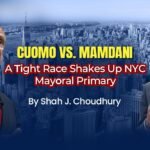
By Shah J. Choudhury | June 12, 2025
As the race for New York City’s next mayor intensifies, one name is commanding attention across boroughs and communities—Zohran Mamdani. If elected, he would not only become the city’s youngest mayor in recent memory but also its first of Muslim faith. In a city that thrives on diversity yet often struggles with division, Mamdani’s candidacy represents a powerful convergence of identity, activism, and vision.
Mamdani, the son of Ugandan-born scholar Mahmood Mamdani and Indian filmmaker Mira Nair, first rose to prominence in 2020 when he won a seat in the New York State Assembly representing Astoria, Queens. Since then, his unapologetically progressive stance on housing, policing, and foreign policy has drawn both praise and criticism.
But as the war in Gaza wages on—with mounting civilian casualties and escalating tensions in New York’s own neighborhoods—Mamdani’s campaign has entered a more complex terrain.
A Candidacy Rooted in Faith and Justice
“My Islam is inseparable from my politics,” Mamdani said at a recent town hall in Jackson Heights, where a multi-ethnic crowd gathered to hear him speak. “It teaches me compassion, justice, and the value of standing with the oppressed.”
In past elections, Mamdani has proudly spoken about fasting during Ramadan while campaigning, or praying between door knocks. Today, that visibility has taken on new urgency—and new risks.
While many progressive voters, particularly among younger and immigrant communities, see Mamdani as a beacon of moral clarity, others accuse him of being too polarizing or idealistic, especially when he calls out U.S. complicity in international violence.
In response, Mamdani remains firm: “Silence is not neutrality—it’s complicity. And if being a Muslim mayor means I must speak for peace, then so be it.”
Bridging Boroughs in a Divided City
What sets Mamdani apart is his ability to link global justice with local survival. In recent weeks, his campaign has launched an initiative called “Housing is a Human Right,” promising rent stabilization, expanded public housing, and protections against gentrification—all while standing with union workers and delivery drivers.
“He’s not just a candidate. He listens like he’s already our mayor,” said Khadija Rahman, a Bronx teacher who attended a recent rally. “When he says ‘our liberation is tied together,’ I believe him.”
Still, challenges lie ahead. Some centrist voters, spooked by his stance on Palestine or by fear of another so-called “ideological” mayor, remain hesitant. And conservative media outlets have begun painting Mamdani as a radical—a tactic reminiscent of how trailblazing candidates are often treated when they first break molds.
A Movement Larger Than a Campaign
But for Mamdani, this election is more than personal. It’s generational. “I’m not asking you to vote for me,” he often says. “I’m asking you to believe that a different New York is possible.”
With coalition support from immigrant rights groups, climate activists, Jewish progressives, and Muslim-led justice organizations, his campaign feels less like a run for office and more like a movement.
Should he win, it will not just be a victory for representation—but a redefinition of what it means to govern in a city as complex, bruised, and hopeful as New York.
And if he loses? Mamdani says he’ll keep fighting.
“My faith teaches me that justice is not a destination. It’s a path. I’m on it, and I’m not walking alone.”







